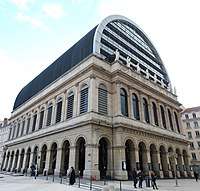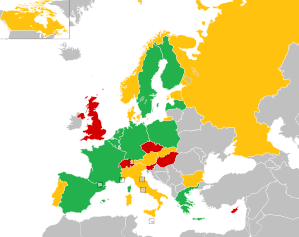Eurovision Young Dancers 1999
| Eurovision Young Dancers 1999 | |
|---|---|
 | |
| Dates | |
| Semi-final | 4 July 1999 |
| Final | 10 July 1999 |
| Host | |
| Venue | Opéra de Lyon, Lyon, France |
| Presenter(s) | Alex Taylor |
| Directed by | Guy Darmet |
| Executive producer |
|
| Host broadcaster | France 3 |
| Interval act | Performance of the hip-hop dance group "Kä-fig" |
| Participants | |
| Number of entries | 16 |
| Debuting countries |
|
| Returning countries | |
| Withdrawing countries | |
|
Participation map
| |
| Vote | |
| Voting system | A professional jury chose the finalists and the top 3 performances |
| Winning dancers |
Stegli Yohan & Katja Wünsche |
The Eurovision Young Dancers 1999 was the eighth edition of the Eurovision Young Dancers, held at the Opéra de Lyon, in Lyon, France on 10 July 1999.[1] Organised by the European Broadcasting Union (EBU) and host broadcaster France 3, dancers from ten countries participated in the televised final. A total of sixteen countries took part in the competition. Czech Republic made their début while host country France, Netherlands, Switzerland and United Kingdom returned. Estonia and Slovakia withdrew from the contest.[1]
Both single dancers and couples younger than 20 could enter the competition, male or female. Single dancers had to perform 2 pieces of maximum 10 minutes in total, while couples could choose to perform 1 or 2 dances, but in total no longer than 10 minutes as well. The semi-final that took place in the same venue 6 days before the final (4 July 1999).[1]
The non-qualified countries were Cyprus, Czech Republic, Hungary, Slovenia, Switzerland and United Kingdom. Katja Wünsche and Stegli Yohan of Germany won the contest, with Sweden and Spain placing second and joint third respectively.[2]
Location

Opéra de Lyon, in Lyon, France was the host venue for the 1999 edition of the Eurovision Young Dancers.[1]
The Opéra Nouvel (Nouvel Opera House) in Lyon, France is the home of the Opéra National de Lyon. The original opera house was re-designed by the distinguished French architect, Jean Nouvel between 1985 and 1993 in association with the agency of scenography dUCKS scéno and the acoustician Peutz. Serge Dorny was appointed general director in 2003.
Format
The format consists of dancers who are non-professional and between the ages of 16–21, competing in a performance of dance routines of their choice, which they have prepared in advance of the competition. All of the acts then take part in a choreographed group dance during 'Young Dancers Week'.[3]
Jury members of a professional aspect and representing the elements of ballet, contemporary, and modern dancing styles, score each of the competing individual and group dance routines. Once all the jury votes have been counted, the two participants which received the highest total of points progress to a final round. The final round consists of a 90-second 'dual', were each of the finalists perform a 45-second random dance-off routine. The overall winner upon completion of the final dances is chosen by the professional jury members.[3]
Results
Preliminary round
A total of sixteen countries took part in the preliminary round of the 1999 contest, of which ten qualified to the televised grand final.[1]
| Country | Name | Result |
|---|---|---|
| Katja Wünsche & Stegli Yohan | Qualified | |
| Frederik Deberdt | Qualified | |
| Dafni Mouyiassi | Failed to qualify | |
| Clara Blanco | Qualified | |
| Aarne Ruutu | Qualified | |
| Emmanuel Eggermont & Juliette Roudet | Qualified | |
| Lara Glew | Failed to qualify | |
| Maria Boubouli | Qualified | |
| Attila Bongar | Failed to qualify | |
| Elza Leimane | Qualified | |
| Ernst Meisner | Qualified | |
| Marta Wojtaszewska & Marcin Krajewski | Qualified | |
| Lukas Slavicky & Zuzana Zahradnikova | Failed to qualify | |
| Ana Klasnja | Failed to qualify | |
| Nathalie Nordquist | Qualified | |
| Laetitia Guggi | Failed to qualify |
Final
Awards were given to the top three countries. The table below highlights these using gold, silver, and bronze. The placing results of the remaining participants is unknown and never made public by the European Broadcasting Union.[2]
| Draw | Country | Participant | Dance | Choreographer | Result |
|---|---|---|---|---|---|
| 08 | Katja Wünsche & Stegli Yohan | "Cinderella" | J. Neumeier | 1 | |
| 10 | Nathalie Nordquist | "Flower Festival in Genzano" | A. Bournonville | 2 | |
| 03 | Clara Blanco | "Variation of Giselle" | J. Coralli & J. Perrot | 3 | |
| 09 | Frederik Deberdt | "La Sylphide" | A. Bournonville | - | |
| 07 | Aarne Ruutu | "La Sylphide" (James variation) | A. Bournonville | - | |
| 04 | Emmanuel Eggermont & Juliette Roudet | "Les Chiens" | J. Bouvier & R. Obadia | - | |
| 01 | Maria Boubouli | "Don Quixote" | M. Petipa | - | |
| 06 | Elza Leimane | "Esmeralda" | J. Perrot | - | |
| 02 | Ernst Meisner | "La fille mal gardée" | J. Dauberval | - | |
| 05 | Marta Wojtaszewska & Marcin Krajewski | "Stars & Stripes" | G. Balanchine | - |
Jury members
The jury members consisted of the following:[1]








Broadcasting
A total of 20 countries broadcast the 1999 event, including Croatia, Ireland, Norway and Russia.[4] Agnes Letestu, the 1989 Eurovision Young Dancers winner, commented on this year's contest for the host broadcaster France 3.
.svg.png)



















See also
References
- 1 2 3 4 5 6 "Eurovision Young Dancers 1999: About the show". European Broadcasting Union. Retrieved 5 October 2014.
- 1 2 "Eurovision Young Dancers 1999: Participants". youngmusicians.tv. European Broadcasting Union. Retrieved 5 October 2014.
- 1 2 "Eurovision Young Dancers - Format". youngdancers.tv. European Broadcasting Union. Retrieved 8 March 2015.
- ↑ "Eurovision Young Dancers 1999". Issuu. Retrieved 2 May 2018.

